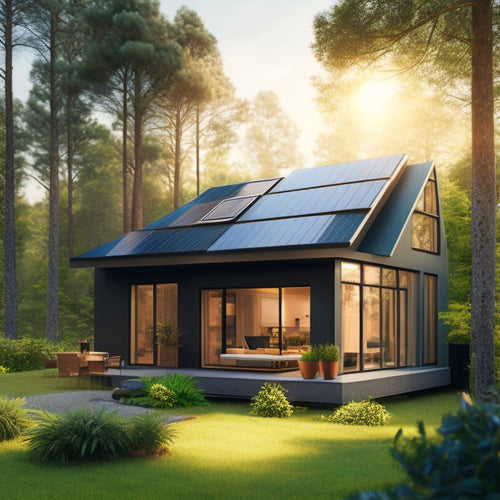
7 Best Solar Battery Storage Systems for Off-Grid Living
Share
When selecting a solar battery storage system for off-grid living, you'll want to evaluate factors like energy density, lifespan, and warranty. Lithium-ion batteries, such as those from Tesla and LG, offer high energy efficiency and long lifetimes, making them a popular choice. Flow batteries and sodium-ion batteries are also gaining traction for long-duration energy storage and cost-effectiveness. Meanwhile, lead-acid and deep cycle batteries provide reliable and affordable options. As you investigate the top-rated systems, you'll find that each has its strengths and weaknesses - and understanding these will be key to finding the best fit for your off-grid energy needs, which we'll examine further.
Key Takeaways
- For off-grid living, lithium-ion batteries offer high energy density, long lifetimes, and high energy efficiency, making them a popular choice.
- Flow batteries are ideal for long-duration energy storage, suited for high power off-grid systems that require extended backup power.
- Consider sodium-ion batteries as a cost-effective alternative to lithium-ion, gaining traction in off-grid storage for sustainable living.
- Leading brands like Tesla, LG, and SimpliPhi Power offer reliable and consistent performance, backed by comprehensive warranties and proven track records.
- Assessing battery capacity, energy management, and integration with solar panels is crucial for selecting the best solar battery storage system for off-grid living.
Top-Rated Deep Cycle Batteries
Selecting the right deep cycle battery is an important step in building a reliable off-grid solar power system. You need a battery that can handle the rigors of daily charging and discharging, as well as the occasional deep discharge.
There are several deep cycle types to choose from, including flooded, AGM, and lithium-ion batteries. Each type has its own strengths and weaknesses, so it's vital to understand your specific needs before making a decision.
When selecting a deep cycle battery, consider factors such as capacity, voltage, and cycle life. Look for batteries with a high depth of discharge (DOD) rating, as this indicates the battery's ability to handle deep discharging.
Additionally, consider the battery's maintenance requirements, as some batteries require regular watering or equalization.
Proper battery maintenance is essential to extending the life of your deep cycle battery. Regularly check the battery's state of charge, voltage, and electrolyte levels.
Perform equalization charges as needed, and consider using a battery monitor to track performance. By choosing the right deep cycle battery and following proper maintenance procedures, you can guarantee a reliable and efficient off-grid solar power system.
Best Value for Off-Grid Homes
Your off-grid home requires a solar battery storage system that provides the best value for your investment. You're looking for a system that balances cost, performance, and reliability.
When it comes to getting the best value, you should prioritize systems that offer a high depth of discharge (DOD), long cycle life, and an extensive warranty. This will guarantee you get the most out of your solar battery benefits, such as energy independence and reduced grid dependence.
Consider systems with lithium-ion batteries, which offer higher energy density and longer lifetimes compared to lead-acid batteries. They may be more expensive upfront, but their longer lifespan and higher efficiency make them a better value in the long run.
Additionally, look for systems with built-in monitoring and control systems, which can help you optimize your energy usage and identify potential issues before they become major problems.
High-Capacity Solar Storage Options
High-capacity solar storage systems are designed to meet the energy demands of larger off-grid homes or those with multiple power-hungry appliances.
You'll need a system that can store excess energy generated by your high-efficiency panels during the day for use at night or on cloudy days.
Systems with higher capacity ratings, typically above 10 kWh, are ideal for homes with larger energy requirements.
These systems often feature advanced battery management systems, guaranteeing efficient charging and discharging.
Look for systems with a high depth of discharge (DOD) to maximize your energy storage potential.
Achieving energy independence is within reach with high-capacity solar storage systems.
By storing excess energy, you can reduce your reliance on generators or the grid, enjoying the freedom and security that comes with off-grid living.
When selecting a high-capacity system, consider your energy needs, budget, and the overall efficiency of the system to guarantee you're getting the most out of your investment.
Long-Lasting Lithium-Ion Systems
Lithium-ion batteries, a staple in modern solar storage systems, boast an impressive lifespan, making them an attractive option for off-grid living. You'll appreciate the lithium longevity, as these batteries can last up to 15 years or more, depending on the manufacturer and usage. This means you can enjoy a reliable source of energy without worrying about frequent replacements.
One of the key benefits of lithium-ion batteries is their energy efficiency. They've a high depth of discharge (DOD), which allows you to use more of the stored energy before recharging is necessary. This results in a more efficient system that reduces waste and saves you money in the long run.
Additionally, lithium-ion batteries are designed to charge and discharge quickly, making them well-suited for off-grid living where energy demands can fluctuate.
When choosing a lithium-ion system, look for manufacturers that offer high-quality cells, a sturdy battery management system, and an extensive warranty. With proper maintenance, your lithium-ion battery will provide you with years of reliable energy storage, giving you the freedom to live off-grid with confidence.
Budget-Friendly Energy Solutions
When you're looking to live off-grid, you're likely on a budget, and your energy storage system shouldn't break the bank.
You need affordable energy options that won't compromise on performance, and that's where budget-friendly solutions come in.
Affordable Energy Options
Embracing off-grid living often means rethinking your energy strategy, and for many, affordable energy options are a top priority. You're likely looking for ways to optimize energy efficiency while keeping costs in check.
One approach is to harness solar incentives, which can greatly reduce the upfront costs of investing in solar panels. By doing so, you can redirect those savings towards other essential off-grid living expenses.
When it comes to affordable energy options, you'll want to focus on energy-efficient solutions that provide the most bang for your buck. This might involve upgrading to energy-efficient appliances, installing smart home devices that monitor and regulate energy usage, or investigating alternative energy sources like wind or hydro power.
Cost-Effective Solutions
Beyond the initial investment, the overall cost-effectiveness of your off-grid energy system relies heavily on the efficiency of your solar battery storage setup. This is where solar power economics come into play, as a well-designed system can greatly reduce your energy costs in the long run.
To achieve energy independence, you'll want to focus on maximizing your system's efficiency while minimizing expenses.
When it comes to budget-friendly energy solutions, consider the following:
-
Optimize your system size: Right-sizing your solar panel array and battery bank guarantees you're generating and storing the right amount of energy for your needs.
-
Choose efficient components: Selecting high-efficiency solar panels and batteries can reduce energy losses and increase overall system performance.
-
Monitor and control energy usage: Implementing a monitoring system and energy management strategy helps you identify areas of inefficiency and make data-driven decisions.
-
Consider a hybrid system: Combining solar power with other renewable energy sources, like wind or hydro power, can provide a more reliable and cost-effective energy solution.
-
Plan for future expansions: Designing your system with scalability in mind allows you to easily add more capacity as your energy needs grow.
Innovative Off-Grid Energy Storage
You're considering innovative off-grid energy storage solutions to power your home.
These state-of-the-art systems integrate seamlessly with renewable energy systems, enabling you to store excess energy generated by your solar panels or wind turbines.
Energy Storage Solutions
Storing excess energy generated from your solar panels is vital for off-grid living, as it allows you to tap into that energy when the sun isn't shining. This is where energy storage solutions come in - they're an important component of your off-grid energy system, ensuring you have a reliable source of power even when the grid is down.
When it comes to energy storage, you have several options to choose from, including:
-
Deep Cycle Batteries: designed to provide a steady flow of energy over a long period, making them ideal for off-grid systems.
-
Lithium-Ion Batteries: offering high energy density and long lifetimes, they're a popular choice for renewable energy systems.
-
Flow Batteries: well-suited for long-duration energy storage, they're perfect for off-grid systems that require a lot of power.
-
Sodium-Ion Batteries: a cost-effective alternative to lithium-ion batteries, they're gaining popularity in off-grid energy storage.
-
Lead-Acid Batteries: a tried-and-true option, they're still a popular choice for off-grid energy storage due to their affordability and reliability.
Powering Off-Grid Homes
As you design your off-grid energy system, powering your home efficiently is a top priority. You want to maximize your solar energy efficiency to guarantee a reliable and sustainable power supply.
When it comes to powering your off-grid home, you'll need a battery storage system that can store excess energy generated by your solar panels during the day for use at night or on cloudy days.
To achieve off-grid sustainability, you'll need to evaluate the capacity and type of batteries, as well as the charging and discharging rates. A deep cycle battery with a high depth of discharge (DOD) is ideal for off-grid applications, as it can handle the daily charge and discharge cycles.
You'll also need to assess the battery management system (BMS) that monitors and controls the charging and discharging of the batteries to prevent overcharging or undercharging.
Renewable Energy Systems
How can you guarantee a seamless shift to renewable energy systems that effectively store excess energy for off-grid living? The key lies in integrating innovative energy storage solutions with your solar panel integration. This assures that you can utilize and store excess energy generated during the day for use during the night or on cloudy days.
To achieve this, you'll need a thorough energy management system that can:
- Monitor and control energy production and consumption in real-time
- Optimize energy storage and discharge based on your energy needs
- Provide data analyses to help you optimize your energy usage
- Integrate with your existing solar panel system and other renewable energy sources
- Guarantee safe and reliable operation of your off-grid energy system
Most Reliable Battery Systems
Reliability is the backbone of any off-grid living setup, and when it comes to solar battery storage systems, it's the difference between comfort and catastrophe. You need a system that can consistently provide power when you need it most.
That's why you should prioritize battery performance and energy efficiency when selecting a reliable battery system. Look for systems with a proven track record of providing consistent power output over time.
Check the manufacturer's warranty and performance guarantees to confirm you're getting a system that can handle the demands of off-grid living. A reliable battery system should also be able to efficiently charge and discharge energy, minimizing waste and maximizing your energy independence.
Some of the most reliable battery systems on the market include those from leading manufacturers like Tesla, LG, and SimpliPhi Power. These systems are designed to provide consistent power output, even in extreme temperatures and weather conditions.
Frequently Asked Questions
Can I Use a Solar Battery Storage System With a Generator?
You can definitely use a solar battery storage system with a generator, ensuring generator compatibility and optimizing solar efficiency. By integrating both, you'll have a reliable, hybrid power solution that reduces your reliance on fossil fuels and increases overall system performance.
How Often Should I Maintain My Off-Grid Solar Battery System?
You'll want to prioritize regular battery maintenance to guarantee peak performance; establish a schedule to check water levels, clean terminals, and monitor charge cycles, following manufacturer-recommended battery maintenance tips and maintenance schedule recommendations.
Are Solar Battery Storage Systems Affected by Extreme Temperatures?
You're wondering if your solar battery storage system can handle extreme temperatures. Coincidentally, it's a common concern! Temperature effects can indeed impact battery lifespan, so it's crucial to choose a system designed to operate within a specific temperature range for peak performance.
Can I Expand My Solar Battery Storage System in the Future?
You can easily expand your solar battery storage system in the future by adding more batteries, increasing battery capacity, or exploring expansion options that allow you to scale up your energy storage needs as required.
Do Solar Battery Storage Systems Have a Warranty or Guarantee?
You're probably thinking, 'What's the catch?' Well, rest assured, most solar battery storage systems come with a warranty, typically ranging from 5 to 10 years, and often include a performance guarantee, giving you peace of mind for your off-grid investment.
Conclusion
You've made it to the end of our thorough guide to the best solar battery storage systems for off-grid living. As you weigh your options, remember that the global energy storage market is projected to reach 1.2 terawatt-hours by 2030, up from just 0.02 terawatt-hours in 2015. This staggering growth highlights the increasing demand for reliable, efficient energy solutions. With the right solar battery storage system, you can tap into this trend and enjoy a sustainable, off-grid lifestyle.
Related Posts
-

What You Need to Know About Permits and Inspections
You need to navigate the complex landscape of permits and inspections to guarantee your project complies with local z...
-

Why Cities Need Smart Charging Infrastructure Now
You're about to experience a tidal wave of electric vehicles hitting your city's streets, and it's essential you're p...
-

Reduce Solar Panel Cost for Your Small Home
By evaluating your energy needs, choosing the right installer, and selecting cost-effective solar panel options, you ...


